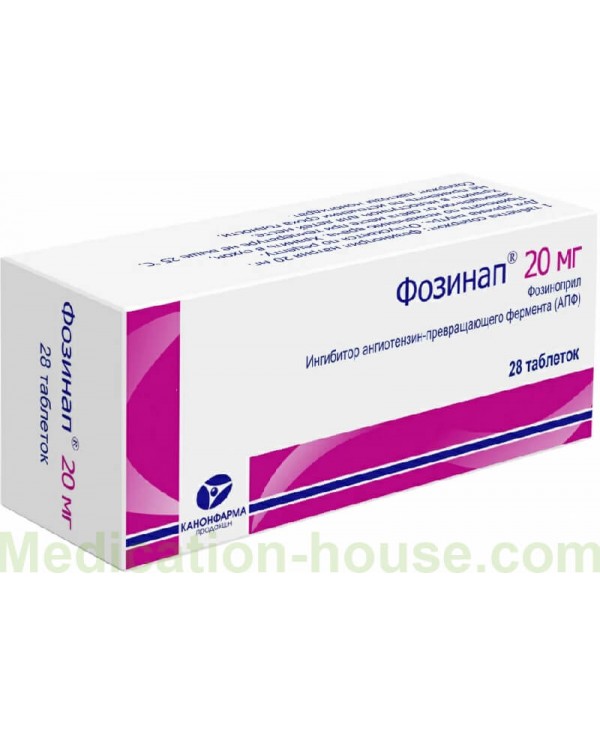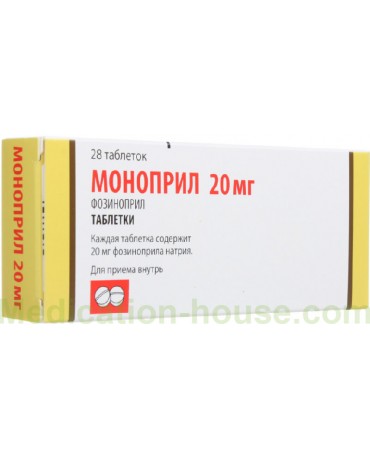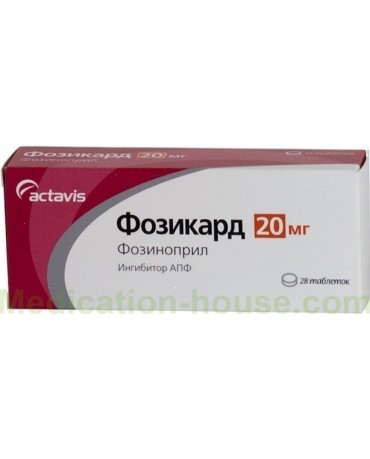Instruction for use of Fosinap
Reed more and buy Fosinap on this page
Fosinap is an antihypertensive drug with a diuretic, potassium-sparing and vasodilating effect.
Release form and composition
Dosage form Fosinap - tablets: flat-cylindrical, round, almost white or white, with acceptable marbling; in a dosage of 10 mg - with a chamfer and a dividing line, 20 mg - with a chamfer (in a blister contour packaging 7, 10, 15 or 30 pcs.; in a cardboard box 1, 2, 4, 8 packs of 7 pcs. or 1, 3 packs of 10 pcs., or 1, 2 packs of 15 pcs., or 1 pack of 30 pcs.).
Composition of 1 tablet:
active substance: fosinopril sodium - 10 or 20 mg;
auxiliary components: colloidal silicon dioxide, lactose monohydrate, croscarmellose sodium, macrogol (polyethylene glycol 4000), povidone, sodium stearyl fumarate, microcrystalline cellulose, calcium stearate.
Pharmacodynamics
The active substance of Fosinap, fosinopril sodium, being an angiotensin converting enzyme (ACE) inhibitor, has hypotensive, diuretic, vasodilating and potassium-sparing effects. Fosinopril reduces the rate of conversion of biologically inactive angiotensin I to the hormone angiotensin II, which causes vasoconstriction, increased blood pressure and the release of aldosterone from the adrenal cortex into the bloodstream. Due to the action of fosinopril, aldosterone synthesis weakens and vasopressor activity decreases, therefore, as a result, a decrease in total peripheral vascular resistance (OPSS) and systemic arterial pressure (BP) occurs. Since the hormone aldosterone causes sodium retention and a lack of potassium in the body, suppression of aldosterone synthesis can lead to a slight increase in the concentration of potassium ions in the blood serum, as well as the loss of fluid and sodium ions in the urine.
Fosinopril increases the level of the peptide bradykinin, which has a pronounced vasodilating effect. This potentiates the hypotensive effect of the drug.
With a decrease in blood pressure, there is no decrease in the BCC (circulating blood volume), changes in the blood supply to internal organs, skin and skeletal muscles, as well as impaired renal and cerebral blood flow, reflex activity of the myocardium. In the case of arterial hypertension and left ventricular hypertrophy, the drug helps to reduce the mass of the left ventricle and the thickness of the interventricular septum of the heart. Long-term treatment does not lead to metabolic disorders.
After taking Fosinap inside, the hypotensive effect develops within 1 hour, reaches a maximum after 3-6 hours, and lasts for 24 hours.
In the case of chronic heart failure, as a result of suppression of the activity of the RAAS (renin-angiotensin system), fosinopril helps to reduce the preload and afterload on the heart muscle, reduce the severity of chronic functional heart failure, and increase the body's resistance to physical stress.
Pharmacokinetics
absorption: after oral administration, approximately 30-40% of the substance is absorbed in the gastrointestinal tract; food intake can slow down absorption, but does not affect the degree of absorption. The maximum concentration in blood plasma (Cmax) does not depend on the dose of the drug and is reached after 3 hours;
distribution: more than 95% of the substance binds to blood plasma proteins; the volume of distribution (Vd) is relatively low, it is not significantly associated with the cellular components of the blood. Fosinopril is unable to cross the BBB (blood-brain barrier);
metabolism: metabolized mainly in the liver and the mucous membrane of the gastrointestinal tract; under the action of liver enzymes, the active metabolite fosinoprilat is formed;
excretion: excreted equally in urine and bile. The half-life (T1 / 2) of fosinoprilat with normal functioning of the kidneys and liver in patients with arterial hypertension is approximately 11.5 hours, in patients with chronic heart failure - about 14 hours.
Indications for use
arterial hypertension (both in monotherapy and in combination therapy);
chronic heart failure (as part of combination therapy).
Contraindications
Absolute:
hereditary or idiopathic angioedema;
angioedema with the use of other ACE inhibitors (in history);
lactase deficiency, lactose intolerance or glucose-galactose malabsorption;
pregnancy and lactation period;
age under 18;
increased individual sensitivity to fosinopril or any of the auxiliary components of the drug.
Relative (diseases / conditions in which the use of Fosinap requires caution):
renal failure;
hyponatremia (risk of arterial hypotension, dehydration, chronic renal failure);
bilateral stenosis of the renal arteries or stenosis of an artery of a solitary kidney;
conditions after kidney transplantation;
carrying out the hemodialysis procedure;
hyperkalemia;
Ischemic heart disease (ischemic heart disease);
chronic heart failure III – IV functional class according to NYHA classification (New York Heart Association);
aortic stenosis;
desensitization;
systemic connective tissue diseases (including systemic lupus erythematosus, scleroderma);
cerebrovascular diseases (including cerebral circulation insufficiency);
diabetes;
oppression of bone marrow hematopoiesis;
gout;
conditions accompanied by a decrease in BCC (including vomiting, diarrhea, previous use of diuretics);
diets with limited salt intake;
elderly age.
Instructions for use: method and dosage
I take Fosinap tablets orally, swallowing them whole with a small amount of liquid, regardless of the meal.
The dose is set by the attending physician individually for each patient.
With arterial hypertension, the recommended starting dose is 10 mg once a day. In the future, the dose depends on the dynamics of lowering blood pressure and varies from 10 to 40 mg once a day. The maximum daily dose is 40 mg.
In chronic heart failure, it is recommended to start treatment with a dose of 5 mg 1 or 2 times a day. The maximum daily dose of Fosinap is 40 mg.
Patients with renal and / or hepatic insufficiency, as well as elderly patients, do not need to adjust the dosage regimen.
Side effects
When using Fosinap, the following side reactions from systems and organs are possible:
cardiovascular system: orthostatic hypotension, significant decrease in blood pressure, collapse, palpitations, tachycardia, angina pectoris, arrhythmias, myocardial infarction, fainting, flushing, cardiac arrest;
central and peripheral nervous system: cerebrovascular ischemia, stroke, headache, dizziness, memory impairment, weakness; in the case of high doses - depression, anxiety, insomnia, paresthesia, drowsiness, confusion;
urinary system: proteinuria, development or exacerbation of chronic renal failure;
digestive system: diarrhea, nausea, vomiting, intestinal obstruction, hepatitis, pancreatitis, cholestatic jaundice, constipation, abdominal pain, flatulence, dysphagia, glossitis, stomatitis, anorexia, dry mouth, change in body weight, impaired appetite, intestinal edema (extremely rare );
sensory organs: tinnitus, visual and hearing impairment;
hematopoietic organs: lymphadenitis;
respiratory system: bronchospasm, pulmonary infiltrates, dry cough, pharyngitis, rhinorrhea, shortness of breath, nosebleeds, dysphonia;
musculoskeletal system: arthritis;
metabolism: gout;
allergic reactions: itching, skin rash, angioedema;
laboratory tests: increased urea, hypercreatininemia, increased hepatic transaminase activity, hyperkalemia, hyperbilirubinemia, hyponatremia, increased erythrocyte sedimentation rate, neutropenia, leukopenia, eosinophilia, decreased hemoglobin and hematocrit.
Overdose
In case of an overdose of Fosinap, the following symptoms may appear: a significant decrease in blood pressure, shock, bradycardia, stupor, acute renal failure, disturbances in the water-salt balance.
In case of an overdose, the drug should be discontinued. Treatment consists in gastric lavage, intake of sorbents (for example, activated carbon), vasoconstrictors, administration of 0.9% sodium chloride solution. Further, symptomatic and supportive therapy is recommended. Hemodialysis with an overdose of fosinopril is not effective.
Special instructions
A few days before starting the use of Fosinap, it is recommended to discontinue previous antihypertensive therapy. Diuretic drugs should be discontinued 2-3 days before starting fosinopril to reduce the risk of arterial hypotension.
It is necessary to monitor kidney function, blood pressure, potassium, urea, creatinine, electrolyte concentration and hepatic enzyme activity in the blood before and during the entire period of Fosinap treatment.
Cases of the development of angioedema have been reported with the use of fosinopril. Excessive swelling of the tongue, larynx, or pharynx can obstruct the airways and be fatal. If such symptoms occur, you should immediately stop taking the drug and conduct emergency therapy, including subcutaneous administration of a solution of epinephrine (epinephrine) in a ratio of 1: 1000.
Edema of the intestinal mucosa, which can be observed in rare cases while taking Fosinap, should be taken into account in the differential diagnosis in patients complaining of abdominal pain during therapy with ACE inhibitors. Such symptoms disappeared after discontinuation of ACE inhibitors.
Against the background of the use of Fosinap during the hemodialysis procedure using high-strength membranes and during plasmapheresis of low-density lipoproteins with adsorption on dextran sulfate, anaphylactic reactions may develop. In these cases, consideration should be given to using a different type of dialysis membrane or alternative medication.
In patients with impaired renal function, especially with concomitant connective tissue diseases (including scleroderma or systemic lupus erythematosus) during therapy with ACE inhibitors, bone marrow function may be suppressed and agranulocytosis may develop. Before starting the use of ACE inhibitors and once a month during the first 3–6 months of treatment (in patients with an increased risk of neutropenia - during the first year), it is recommended to monitor the total number of leukocytes and leukocyte count.
After intensive use of diuretics, dietary salt restriction or during kidney dialysis, the likelihood of developing symptomatic arterial hypotension is quite high, which is not a contraindication for further use of Fosinap.
In patients with arterial hypertension with concomitant bilateral stenosis of the renal arteries or stenosis of an artery of a solitary kidney, as well as in patients with unchanged renal function when taking diuretics together during therapy with ACE inhibitors, it is possible to increase the concentration of urea nitrogen and creatinine in the blood serum. In such cases, these indicators should be monitored and, if necessary, the dose of Fosinap and / or diuretic should be reduced.
When treating patients with chronic heart failure, medical supervision is necessary, especially during the first two weeks of therapy and with each increase in the dose of Fosinap or a diuretic, since the use of ACE inhibitors in such patients can lead to a more pronounced antihypertensive effect and an increased risk of developing oliguria or azotemia with fatal the outcome.
In the case of a pronounced increase in the activity of hepatic transaminases and the manifestation of noticeable yellowness, the drug should be discontinued with the appointment of appropriate treatment.
Before surgical manipulations (including dentistry) about the use of Fosinap, it is necessary to inform the anesthesiologist, since the hypotensive effect of drugs used for general anesthesia can be enhanced by ACE inhibitors.
When using Fosinap, care must be taken in hot weather or when performing intense physical activities due to the possible risk of dehydration and arterial hypotension due to a decrease in the BCC.
Influence on the ability to drive vehicles and complex mechanisms
When driving vehicles and performing activities that require increased attention and a quick mental / motor reaction, it is necessary to take into account the possibility of dizziness during drug treatment (especially at the beginning of therapy) and be careful.
Application during pregnancy and lactation
The use of Fosinap during pregnancy is contraindicated. The drug has a negative effect on the fetus: it can contribute to impaired development and function of the kidneys, a decrease in the blood pressure of the fetus and newborn, hyperkalemia, hypoplasia of the skull bones, oligohydramnios, contracture of the extremities, hypoplasia of the lungs. Taking Fosinap in the II and III trimesters of pregnancy can cause damage or death of the fetus.
Newborns whose mothers took ACE inhibitors during pregnancy require careful medical supervision for the timely diagnosis of arterial hypotension, hyperkalemia and oliguria.
Since fosinopril passes into breast milk, if it is necessary to use it during lactation, breastfeeding should be discontinued.
Childhood use
The safety and efficacy of Fosinap in pediatrics has not been established, therefore, it is prohibited to prescribe it to children and adolescents under 18 years of age.
With impaired renal function
According to the instructions, Fosinap should be used with caution in patients with impaired renal function, with bilateral renal artery stenosis or stenosis of an artery of a single kidney, as well as after kidney transplantation.
There is no need to adjust the dosage regimen for renal failure.
For violations of liver function
In case of violations of the functioning of the liver, it is not necessary to adjust the dosage regimen of Fosinap.
Use in the elderly
Elderly patients do not need to adjust the dosage regimen of the drug, however, prescribe Fosinap to such patients with caution.
Drug interactions
The use of fosinopril concurrently with some drugs can lead to the development of the following effects:
antacids (including aluminum hydroxide, magnesium hydroxide): reducing the absorption of fosinopril. The interval between taking fosinopril and antacids should be at least 2 hours;
lithium preparations: an increase in the content of lithium in the blood plasma and an increase in the risk of lithium intoxication. The level of concentration of lithium in the blood should be monitored;
indomethacin and other NSAIDs (non-steroidal anti-inflammatory drugs), including acetylsalicylic acid at a dose of more than 3 g and cyclooxygenase-2 inhibitors: reducing the antihypertensive effect of fosinopril, especially in patients with low-grade arterial hypertension;
diuretic drugs: increased risk of severe arterial hypotension, especially in the first hour after taking the starting dose of fosinopril;
potassium preparations, potassium-sparing diuretics (including triamterene, spironolactone, amiloride), food supplements containing potassium, and other drugs that cause an increase in serum potassium concentration (for example, heparin): an increased risk of hyperkalemia (especially in patients with chronic heart failure and diabetes mellitus);
insulin, sulfonylurea derivatives: enhancement of their hypoglycemic effect;
cytostatic agents, immunosuppressants, allopurinol, procainamide: increased risk of leukopenia;
estrogens: weakening of the hypotensive effect of fosinopril due to its ability to retain fluid in the body;
antihypertensive drugs, opioid analgesics, drugs used for general anesthesia: increasing the hypotensive effect of fosinopril;
propranolol, nifedipine, chlorthalidone, digoxin, propantheline bromide, metoclopramide, cimetidine, hydrochlorothiazide, warfarin and acetylsalicylic acid: the bioavailability of fosinopril does not change.
Terms and conditions of storage
Store in a dry, dark place at a temperature not exceeding 25 ° C.
Keep out of the reach of children.
Shelf life is 2 years.
Reviews
Judging by the reviews about Fosinap, the drug lowers blood pressure well even in patients with severe and prolonged arterial hypertension.
Side effects are less pronounced than with the use of similar antihypertensive drugs.
Terms of sell
You don't need a prescription to buy Fosinap.



